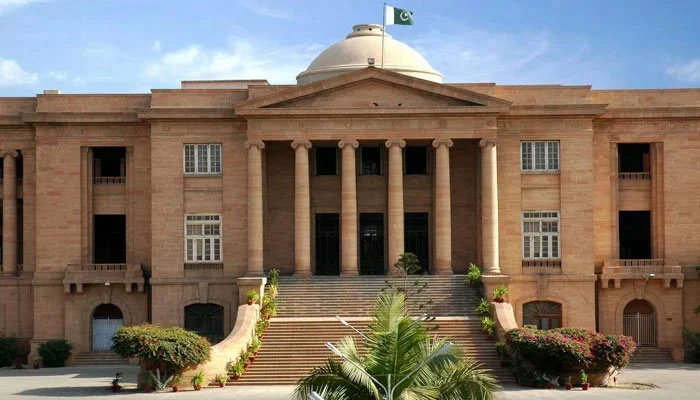SHC concerned over defective investigations in honour killing cases
The Sindh High Court (SHC) has taken exception to the increasing number of criminal cases in the court that have arisen out of alleged honour killing incidents, and directed the government to deal such cases with effective policing, investigation and prosecution.
Issuing a judgment on the appeals of convicts against their conviction in an honour killing case, a single bench of the SHC comprising Justice Omar Sial observed that there was immediate need for the government to address the issue of honour killings effectively.
The high court observed that those who killed persons on the pretext of honour had strategies chalked out perfectly. The SHC observed that the modus operandi deployed to commit such crimes was well known to all in the criminal justice system but it ended with the acquittal of the accused because of failure in the investigations.
The bench observed that police officers in these cases treated such cases of gender-based violence in a non-serious and arbitrary manner and such investigators must change their mindset.
The SHC observed that courts had to acquit the accused as the case needed to be decided on evidence. The high court observed that resources must be deployed immediately to train the investigators and make available the finances, knowledge, equipment, training and expertise to them so that a meaningful collection of evidence could be ensured.
It observed that it must be kept in mind that honour killings may have far reaching consequences for society and the country than the dacoits of the province. The SHC observed that advanced investigation equipment should be procured on a priority basis and if this was not done, such offenders would keep getting free because of lack of evidence.
The high court observed that mere criminalisation of the offence would not help much if effective policing, investigation and prosecution were not done to deal with the honour killing cases.
The bench observed that the Sindh government always had a progressive mindset and it led the country in introducing gender- and juvenile-based legislation. The SHC expressed the hope that the provincial government would give immediate attention to this critical issue.
The SHC directed the Sindh prosecutor general to review the performances of his colleagues prosecuting such cases. The high court also directed the prosecution department to stop forwarding charge sheets in all cases, especially in gender-based cases, in a mechanical, stereotypical and reckless manner without application of the mind.
The SHC also acquitted the appellants Sobho, Niaz and Ahsan from the charge of murdering Iqbal and Mansoor over honour in the Stuart Ganj area stating that the prosecution had failed to prove charges against them.
The high court observed that both the prosecution witnesses were declared hostile whereas feeble and unprofessional cross-examination conducted by the state counsel did not help the prosecution case.
-
 Timothee Chalamet Felt '17 Again' After Reunion With 'Interstellar' Director Christopher Nolan
Timothee Chalamet Felt '17 Again' After Reunion With 'Interstellar' Director Christopher Nolan -
 Conan O'Brien Speaks First Time After Rob Reiner's Killing
Conan O'Brien Speaks First Time After Rob Reiner's Killing -
 Giant Tortoise Reintroduced To Island After Almost 200 Years
Giant Tortoise Reintroduced To Island After Almost 200 Years -
 Eric Dane Drops Raw Confession For Rebecca Gayheart In Final Interview
Eric Dane Drops Raw Confession For Rebecca Gayheart In Final Interview -
 Trump Announces New 10% Global Tariff After Supreme Court Setback
Trump Announces New 10% Global Tariff After Supreme Court Setback -
 Influencer Dies Days After Plastic Surgery: Are Cosmetic Procedures Really Safe?
Influencer Dies Days After Plastic Surgery: Are Cosmetic Procedures Really Safe? -
 Eric Dane Confesses Heartbreaking Regret About Daughters' Weddings Before Death
Eric Dane Confesses Heartbreaking Regret About Daughters' Weddings Before Death -
 Nicole 'Snooki' Polizzi Reveals Stage 1 Cervical Cancer Diagnosis
Nicole 'Snooki' Polizzi Reveals Stage 1 Cervical Cancer Diagnosis -
 Timothee Chalamet Admits He Was 'grumpy' Before Beau Kylie Jenner's Unexpected Move
Timothee Chalamet Admits He Was 'grumpy' Before Beau Kylie Jenner's Unexpected Move -
 Hilary Duff’s Son Roasts Her Outfit In New Album Interview
Hilary Duff’s Son Roasts Her Outfit In New Album Interview -
 Alexandra Daddario, Andrew Form Part Ways After 3 Years Of Marriage
Alexandra Daddario, Andrew Form Part Ways After 3 Years Of Marriage -
 Eric Dane Rejected Sex Symbol Label
Eric Dane Rejected Sex Symbol Label -
 Avan Jogia Says Life With Fiancee Halsey Feels Like 'coming Home'
Avan Jogia Says Life With Fiancee Halsey Feels Like 'coming Home' -
 Kate Middleton's Role In Handling Prince William And Harry Feud Revealed
Kate Middleton's Role In Handling Prince William And Harry Feud Revealed -
 Tucker Carlson Says Passport Seized, Staff Member Questioned At Israel Airport
Tucker Carlson Says Passport Seized, Staff Member Questioned At Israel Airport -
 David, Victoria Beckham Gushes Over 'fiercely Loyal' Son Cruz On Special Day
David, Victoria Beckham Gushes Over 'fiercely Loyal' Son Cruz On Special Day




